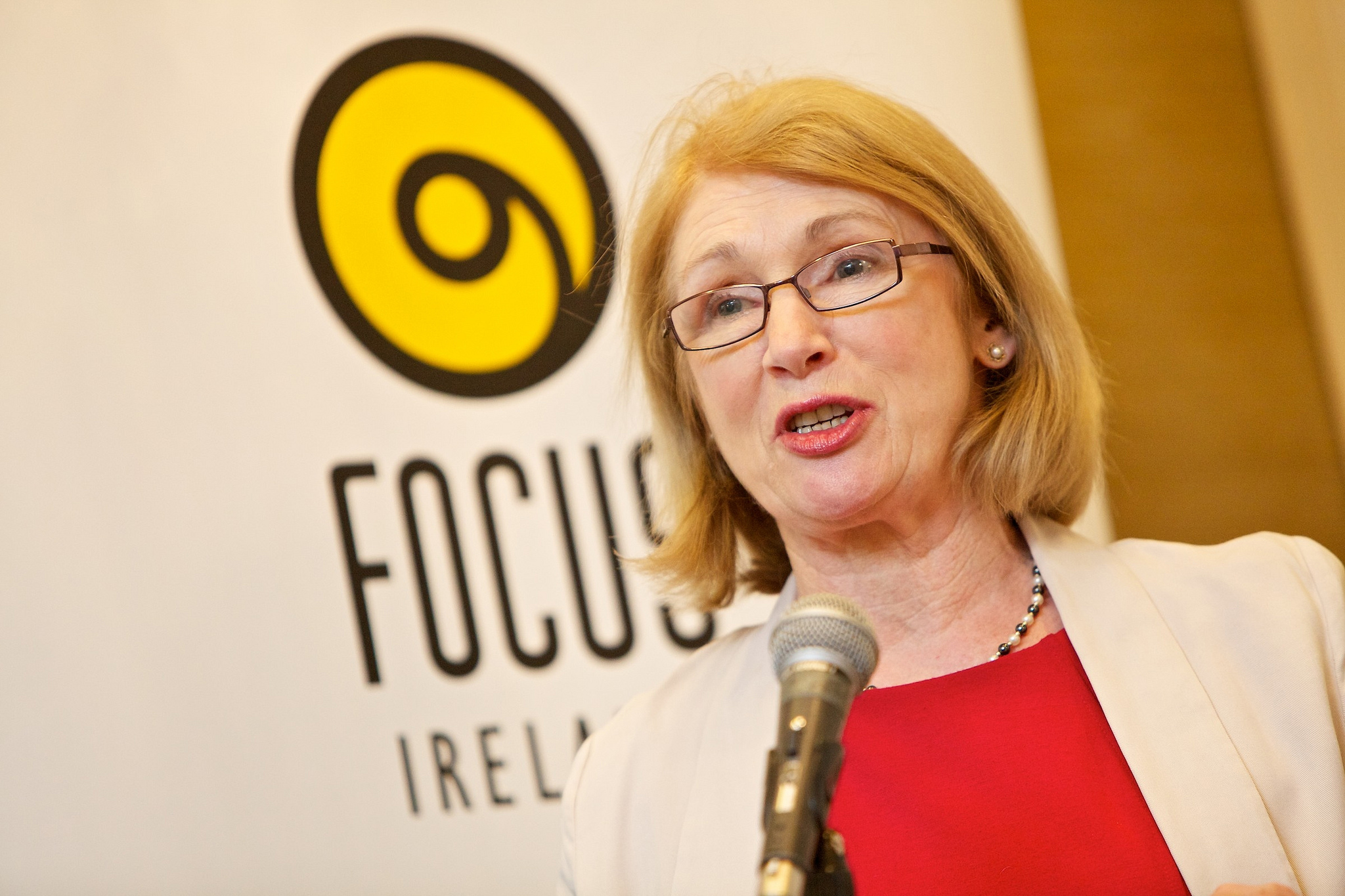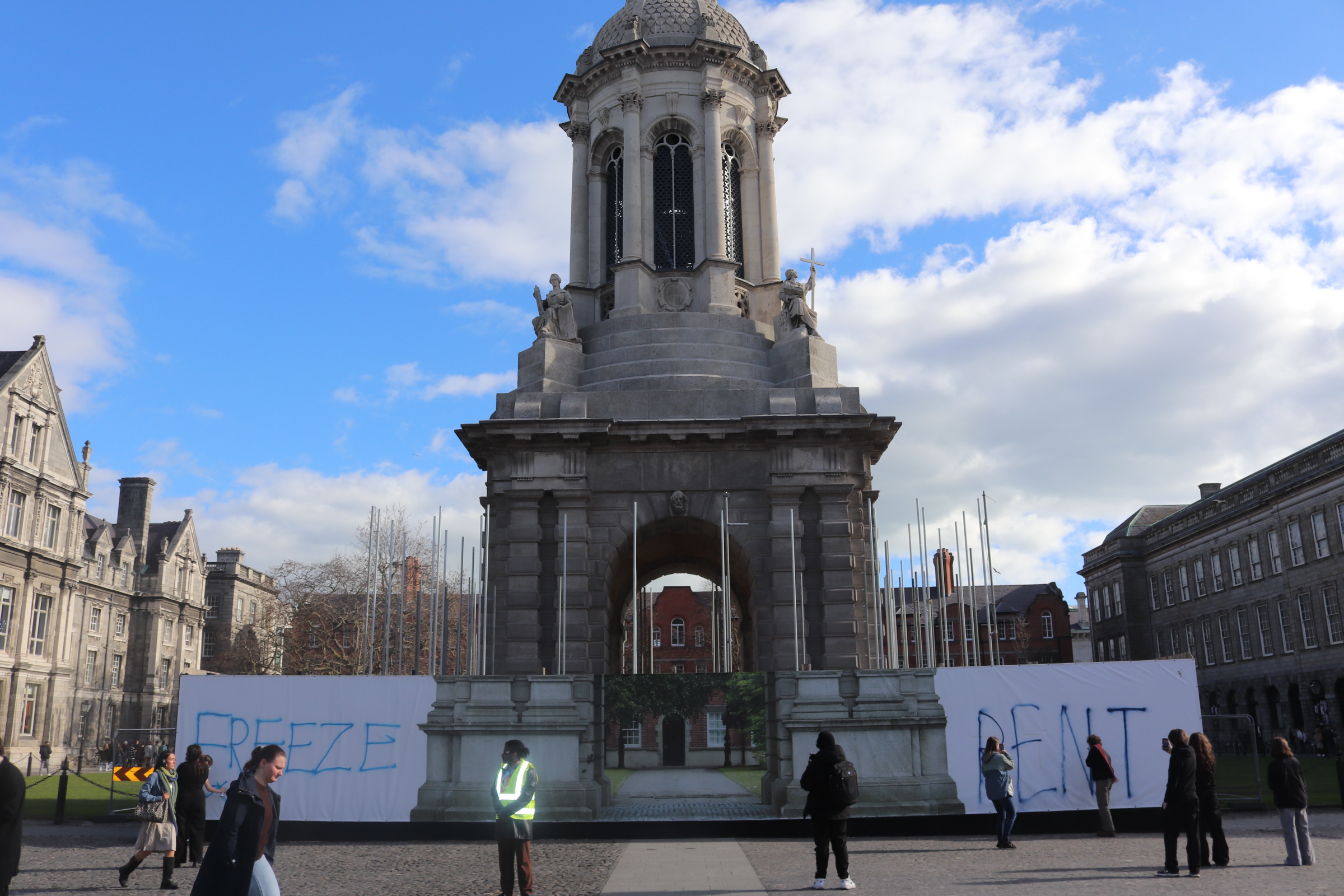The only logical way to open an interview with the Minister for Education and Skills is to discuss the higher education funding question. Jan O’Sullivan’s predecessor, Ruairí Quinn, made perhaps the most categorically stupid election pledge right outside Front Arch in 2011, close to eight weeks before he became Minister, promising to freeze the Student Contribution Charge at €1500. Several weeks after he came into office, he was forced to make the decision to increase the charge by €250 each year. The charge currently stands at €2750, and will make a final jump to €3000 next year. When I brought this up, Jan O’Sullivan was very clear – that decision has already long been made: “The decision in relation to the gradual increase has been made, but next year’s tranche is the last element of that decision. So, bringing it up to €3000 – now, I do not want it to go any higher than that. I mean I think I will not be undoing decisions that are already made at this stage.”
I certainly don’t want to go down the road of, you know, students finish and end up with a very large bill – with people owing €50,000. I don’t want to go down that route.
With regards to the funding situation specifically, O’Sullivan was also quick to point out that a working group on this issue is due to report by the end of next year. In 2011, right after categorically ruling out a state-supported student loan facility, Ruairí Quinn commissioned the Higher Education Authority (HEA) to do a report on the funding situation – and they were to report back by the end of the year. They reported back the following November, but their recommendations – to increase the Student Contribution charge in the short-term, and to introduce the very type of loan facility Quinn had opposed – were swiftly brushed under the carpet and the recommendations from the report subsequently received very little attention.
So this new report commissioned by Quinn only recently before Jan O’Sullivan took office is the second such report in the lifetime of the current government. On this working group, entitled the Government Working Group of Higher Education Funding, O’Sullivan had a lot to say: “You’re probably aware that there is a working group under Peter Cassels that has been given the job of looking into a whole variety of things around higher education and the funding of it. That group will report sometime next year as I understand it. It’s looking at the whole broad area of how higher education institutions operate, in terms of responding to societal need and so on. So, obviously, the funding is a central element of it. Now, I suppose at this stage, I don’t want to pre-empt what’s going to be be in it because I hope there will be a broad debate on it when the recommendations come out. I’m obviously aware of other countries and things that have been done in other countries. I certainly don’t want to go down the road of, you know, students finish and end up with a very large bill – with people owing €50,000. I don’t want to go down that route. I don’t want to pre-empt either.”
The notion of not pre-empting a report sounds like a logical thing to do. Coming out now – and saying something – could undermine the recommendations when they do come next year. But then again, ignoring an entire report on the very same issue like what was done in 2011 also does the same thing. It’s undermining. Either way, it means that O’Sullivan felt unable to rule out any possibility – be it tuition fees, a loan facility, or increases in the Student Contribution Charge – from the report. So when Minister O’Sullivan said she did not want the Student Contribution to go above €3000, or when she said that she did not want to go down the road of large sums of deferred debt (which is inevitable in some shape or form with most types of loan facilities), she was not ruling out these possibilities in the future – especially when I asked her directly. When I asked if she would oppose a student loan facility or even if she could say she didn’t want a student loan facility, O’Sullivan said:
“I’m not saying that either, because I don’t want to pre-empt whatever might come out or whatever might be recommended. I think it would be wrong for me to say ‘I’m ruling out this, this, or this,’ but what I am saying is that I do recognise that I suppose in the more extreme situations that have arisen in other countries, we need to learn from them. We can’t go down the road of something that would be such a deterrent that it would stop people from going on to higher education. Because I do want to ensure that we don’t stop people from being able to take that option because of a fear of either current costs or future costs.”
I think universities are not just there to be utilitarian. They are there to be developers of the human person as well as obviously to feed into the economy.
O’Sullivan, however, seemed astutely aware of the difficulties that would arise from each option, especially in how deferred debt would act as a deterrent to those wanting to pursue third-level education. She also said that, in terms of a contribution from students towards their education, that it “would never expected to be the full cost.” She went on to say that she recognised that “the state has to subvent higher education to some extent. No matter what system you have, you don’t expect students to pay for the full cost. There is obviously the benefit to the individual student but it’s also a benefit to society and that has to be fed into whatever decisions that are made.” Once again reiterating that she could not pre-empt the report, O’Sullivan said she wanted to “do justice to the complexity of the thing [the working group has] been asked to do.”

Universities, and Trinity specifically, seem to be putting huge focus on entrepreneurship. The Provost has even published a strategy for entrepreneurship. On this push for entrepreneurship in the higher education sector, O’Sullivan said: “I mean I think universities are not just there to be utilitarian. They are there to be developers of the human person as well as obviously to feed into the economy. So I see it as a much broader and more complex role than purely a utilitarian role, and I will be publishing legislation with regard to the whole reform of the sector and the Universities Act that’s there has been around now for quite some time and we need to look at that whole area. So yeah, I mean I do see [universities] as having a very broad function and you know to encourage public debate as well, and to feed into the way in which the society looks at itself. So it’s much broader than just feeding into the economy.”
She went on to say, however, that she felt “Trinity would have the [right] balance”, and said in Trinity, “there are very strong humanities as well as science faculties” and that “the focus on research, applied research and links with the economy” is “important too”, but that she thought “other areas [were] equally important.”
While O’Sullivan agreed that universities should be concerned about their global reputation, she laughed several times when I brought up the €100,000 cost of the identity initiative.
We also briefly discussed the issue of third-level entry reform, and the push for broader-entry degrees. Trinity, as recently as April, has been pushed to reduce the number of course codes on the CAO system, with a particular focus in reducing the number of codes from the two-subject moderatorship (TSM) course. O’Sullivan seemed to have no issue with the number of course codes in TSM, which may be a relief to administration in the TSM office. She did think however that courses such as engineering should be common entry and that students should branch off in later years. O’Sullivan said she was particularly in favour of weighting subjects related to the degree you’re applying for, so that, for instance, you’d get more points with science subjects if you were applying for a science degree. I pointed out that the Hyland Report, also from 2011, made that recommendation, and asked if there were any plans for such a system. Again, O’Sullivan said: “We’re going to wait for the report.”
With regards to access programs in Trinity, O’Sullivan said: “I like the new thing that Trinity have done as well with the twenty-five students that have come in in a different way, where your ranking in your own school as well as your Leaving Cert results as well as kind of an interview process – all of those.”
I asked if she would consider bringing such a system in across the board: “It’s obviously something that we now want to see how it works. It might be cumbersome to do it right across the board but I think it has some merits. I think we should look and see how it succeeds. There are other access programs – good access programs – and Trinity has a long tradition of good access programs and I would be supportive of those and I would be supportive of allowing mature students a second chance and the disability access as well are all positives.”
I think it’s a lot more difficult for students because there’s a lot more academic pressure than there was and maybe in some ways we need to ease off the academic pressure a little bit and give more time for students to talk about ideas.
While O’Sullivan agreed that universities should be concerned about their global reputation, she laughed several times when I brought up the €100,000 cost of the identity initiative, saying: “I don’t think logos are very important one way or the other, obviously branding is… the term branding isn’t a word that I like. People have a perception of anything, of an institution, of something that they eat, of a person if you like, so you have to be conscious of how people see you, and you have to present yourself in a way… it should reflect who you are rather than a false thing separated from the reality of what you are.”
On whether €100,000 specifically was a good spend, she also laughed: “It’s not my job to criticise one way or the other but it wouldn’t be the thing that would impress me about a university. I wouldn’t care about its logo but rather what judgement I can make about it as a whole.”
O’Sullivan studied TSM English and French in Trinity in the late sixties. I asked if she had any specific memories of Trinity: “Well I suppose I went to Trinity a long, long time ago now but it was at a very exciting time because it was 1968, and the French students were rebelling and there was a worldwide student movement of examining everything, so it was a very exciting time. There was a huge amount of public debate, like meetings in Front Square, talking about revolution and so on, so my years in Trinity were extraordinarily exciting. I also was there at a time when there were people like Brendan Kennelly, Eiléan Ní Chuilleanáin, Eoin Sheehy Skeffington – I don’t know if those names mean anything to you or if any of them are still around – David Norris, they were all lecturers that I had.”
O’Sullivan remarked that she wasn’t particularly involved in student politics which “is probably unusual for a Labour Party public representative”.
Commenting on her background before coming to Trinity, and what she subsequently learned in Trinity, she said: “I was very very lucky in terms of like I suppose I grew up in the mid-west of Ireland but came to Trinity and it was genuinely a very formative experience in terms of opening my eyes to a world that I wouldn’t otherwise, I think, have realised. A world of ideas, a world of your right to question things and I think that really was a positive experience. I think it’s a lot more difficult for students because there’s a lot more academic pressure than there was and maybe in some ways we need to ease off the academic pressure a little bit and give more time for students to talk about ideas.”







